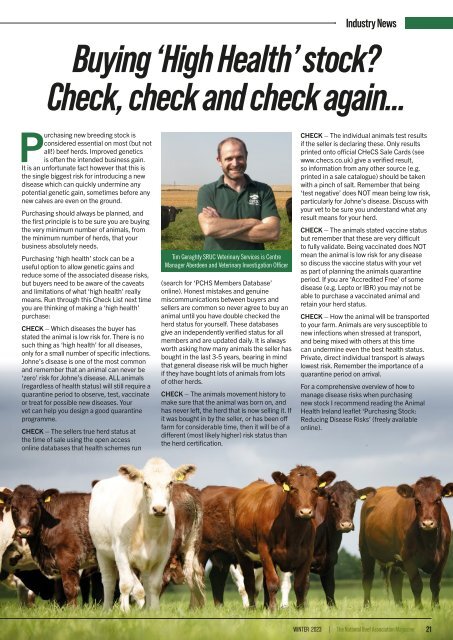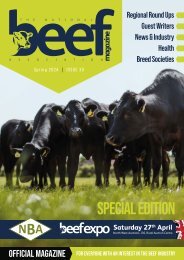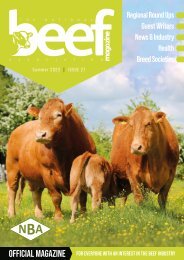NBA Winter Magazine_2023_
For everyone with an interest in the British Beef Industry
For everyone with an interest in the British Beef Industry
You also want an ePaper? Increase the reach of your titles
YUMPU automatically turns print PDFs into web optimized ePapers that Google loves.
Industry News<br />
Buying ‘High Health’ stock?<br />
Check, check and check again…<br />
Purchasing new breeding stock is<br />
considered essential on most (but not<br />
all!) beef herds. Improved genetics<br />
is often the intended business gain.<br />
It is an unfortunate fact however that this is<br />
the single biggest risk for introducing a new<br />
disease which can quickly undermine any<br />
potential genetic gain, sometimes before any<br />
new calves are even on the ground.<br />
Purchasing should always be planned, and<br />
the first principle is to be sure you are buying<br />
the very minimum number of animals, from<br />
the minimum number of herds, that your<br />
business absolutely needs.<br />
Purchasing ‘high health’ stock can be a<br />
useful option to allow genetic gains and<br />
reduce some of the associated disease risks,<br />
but buyers need to be aware of the caveats<br />
and limitations of what ‘high health’ really<br />
means. Run through this Check List next time<br />
you are thinking of making a ‘high health’<br />
purchase:<br />
CHECK – Which diseases the buyer has<br />
stated the animal is low risk for. There is no<br />
such thing as ‘high health’ for all diseases,<br />
only for a small number of specific infections.<br />
Johne’s disease is one of the most common<br />
and remember that an animal can never be<br />
‘zero’ risk for Johne’s disease. ALL animals<br />
(regardless of health status) will still require a<br />
quarantine period to observe, test, vaccinate<br />
or treat for possible new diseases. Your<br />
vet can help you design a good quarantine<br />
programme.<br />
CHECK – The sellers true herd status at<br />
the time of sale using the open access<br />
online databases that health schemes run<br />
Tim Geraghty SRUC Veterinary Services is Centre<br />
Manager Aberdeen and Veterinary Investigation Officer<br />
(search for ‘PCHS Members Database’<br />
online). Honest mistakes and genuine<br />
miscommunications between buyers and<br />
sellers are common so never agree to buy an<br />
animal until you have double checked the<br />
herd status for yourself. These databases<br />
give an independently verified status for all<br />
members and are updated daily. It is always<br />
worth asking how many animals the seller has<br />
bought in the last 3-5 years, bearing in mind<br />
that general disease risk will be much higher<br />
if they have bought lots of animals from lots<br />
of other herds.<br />
CHECK – The animals movement history to<br />
make sure that the animal was born on, and<br />
has never left, the herd that is now selling it. If<br />
it was bought in by the seller, or has been off<br />
farm for considerable time, then it will be of a<br />
different (most likely higher) risk status than<br />
the herd certification.<br />
CHECK – The individual animals test results<br />
if the seller is declaring these. Only results<br />
printed onto official CHeCS Sale Cards (see<br />
www.checs.co.uk) give a verified result,<br />
so information from any other source (e.g.<br />
printed in a sale catalogue) should be taken<br />
with a pinch of salt. Remember that being<br />
‘test negative’ does NOT mean being low risk,<br />
particularly for Johne’s disease. Discuss with<br />
your vet to be sure you understand what any<br />
result means for your herd.<br />
CHECK – The animals stated vaccine status<br />
but remember that these are very difficult<br />
to fully validate. Being vaccinated does NOT<br />
mean the animal is low risk for any disease<br />
so discuss the vaccine status with your vet<br />
as part of planning the animals quarantine<br />
period. If you are ‘Accredited Free’ of some<br />
disease (e.g. Lepto or IBR) you may not be<br />
able to purchase a vaccinated animal and<br />
retain your herd status.<br />
CHECK – How the animal will be transported<br />
to your farm. Animals are very susceptible to<br />
new infections when stressed at transport,<br />
and being mixed with others at this time<br />
can undermine even the best health status.<br />
Private, direct individual transport is always<br />
lowest risk. Remember the importance of a<br />
quarantine period on arrival.<br />
For a comprehensive overview of how to<br />
manage disease risks when purchasing<br />
new stock I recommend reading the Animal<br />
Health Ireland leaflet ‘Purchasing Stock:<br />
Reducing Disease Risks’ (freely available<br />
online).<br />
WINTER <strong>2023</strong> | The National Beef Association <strong>Magazine</strong> 21






